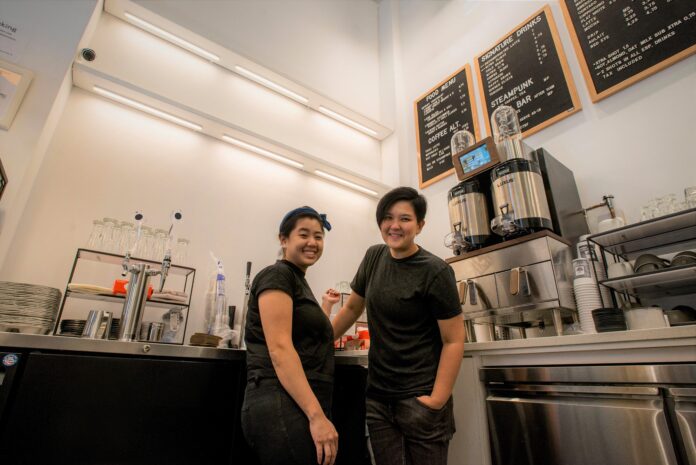Photo by Benjamin Schmerler
By Yunkyo Kim, AsAmNews Intern
Malaysia-born Chi Sum Ngai and Kaleena Teoh opened Coffee Project NY in 2015 not only to serve good coffee, but also to build community.
The couple founded their first cafe in East Village in 2015, around the same time they married following legalization of same-sex marriage.
Ngai and Teoh are part of a shift in New York’s specialty coffee scene. Until a few years ago, fine coffee makers in the city looked predominantly White and male, they said. And that has excluded people like Ngai and Teoh, who are queer Asian women, as well as many of the project’s diverse team members.
“When people go into [a specialty coffee shop,] people are expecting to see a White barista, or a very hipster-looking barista,” Teoh said. “So, when [Ngai] and I opened our first location, it was a little bit of a struggle, honestly, because people would come in, they’ll see who’s behind the bar … and there were instances where people walked out. And it’s a very true reality.”
Teoh recounted an instance in which a customer kept asking a White, male barista whether he was the owner of the shop, while she stood close by.
“[The customer] was like, ‘Why didn’t you tell me [that you were the owner]?'” Teoh said. “I’m like, ‘You didn’t ask me.'”
Peace, a manager at the project’s East Village location who identifies as Thai and Chinese, said she experienced racism and sexism while she was working at another coffee company prior to Coffee Project NY.
After working two years there, Peace said she was looking forward to moving up the chain to learn more about specialty coffee production. Instead, she said, she was discouraged from applying with a vague reasoning tied to her gender.
Peace said she knew she was a talented and capable coffee taster who wanted to be taken seriously. She left the company and has been at Coffee Project NY for the last year and a half, she said, earning national top 20 at a brewing championship last year. At the time, Peace was the only barista who entered the competition with beans from Thailand, Teoh said.
And to Peace, coffee is more than a passion, but a way to make her family proud and show that coffee is “not a bad option to be a professional.”
“With this company I’ve seen myself that I can grow into a different direction,” she said. “I also know that they are willing to provide me any opportunity that I was looking for or wanted to try out. So my passion for coffee actually is not just to make coffee but I also want to prove myself to my family.”
Given these experiences, Ngai said she wants Coffee Project NY to be a welcoming place rather than an intimidating one. Ngai agrees
When Ngai immigrated to the United States and started her own shop, she made sure she was on a first-name basis with many of her customers, she said.
This sense of community and familiarity has remained throughout the pandemic.
Every day at 12:30 for more than two months, Coffee Project NY hosted a “brew party” on Instagram live, where staff members brewed “different coffees from everywhere.” The initiative was the project’s response to customers who said that getting coffee was their only source of daily normalcy during the pandemic.
The “brew party” is still ongoing, Teoh said, now on a weekly basis.

That feeling of community extends to their customers. Earlier this year, a patron pitched in by illustrating a mug to help fundraise for their baristas struggling amid the pandemic. All funds raised from the sale of the $25 mug go toward their baristas.
So, what’s next for the project? Ngai says it’s all about growing together.
Coffee Project NY seeks to expand its employees while figuring out ways to offer benefits so that coffee could become a sustainable profession. Recently, it instituted vacation hours, Ngai said, and looks forward to offering medical insurance.
“This is my main goal,” Ngai said, “[to] grow in a way that everybody else in the company grows.”
So, Coffee Project NY feels like a tight-knit community — despite the fact that the operation has four locations spread throughout New York City.
Within five years, their small business has expanded to Chelsea, Fort Green and Long Island City, amassing almost 20 team members in the process. This growth included opening a roastery and a Specialty Coffee Association Premier Training Campus, a rigorous campus for baristas and the only one of its kind in the state.
Accompanying the success of the endeavor were the accolades; publications such as The New York Times, TimeOut and Thrillist featured the operation, praising its “three-piece deconstructed latte” and “progressive, playful drink creations.”
But, Coffee Project NY is trying to be progressive beyond flavor. Ngai, who oversees the operation as well as quality control and roasting, said she directly communicates with farmers to make sure their beans are fairly priced, something the operation has been working on since its opening.
“Our goal is very simple,” Ngai said. “We just want to make sure everyone’s quality of life in the coffee supply chain — from farmers all the way to consumers — is being well taken care of.”
AsAmNews has Asian America in its heart. We’re an all-volunteer effort of dedicated staff and interns. Check out our new Instagram account. Go to our Twitter feed and Facebook page for more content. Please consider interning, joining our staff, or submitting a story.

